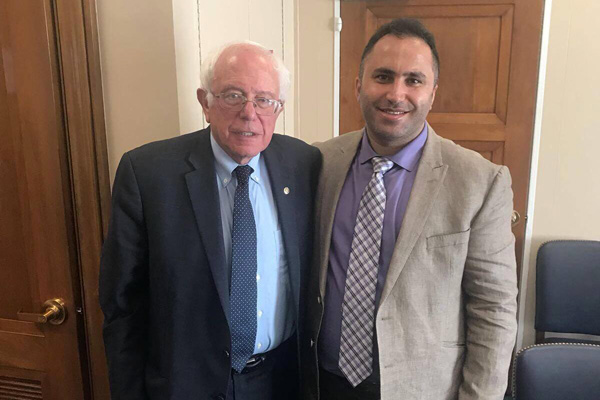On trial in an Israeli military court for nonviolently opposing the occupation, the odds are stacked against Palestinian human rights defender Issa Amro. With the support of U.S. progressives like Bernie Sanders, he might just stand a chance.
By Maya Garner
It is a big deal when high profile American politicians like Bernie Sanders stand up for a Palestinian. After a nearly year-long trial in Israeli military court, and fresh out of PA custody just weeks earlier, Issa Amro traveled to the United States to meet with his supporters in Washington last week. Earlier in 2017, Sanders and dozens of other Senators and members of Congress called on the State Department to monitor Amro’s military trial. This degree of support is a rare expression of solidarity for Palestinian rights. However, Israel seems willing to put its international reputation on the line in order to put Amro behind bars.
The charges the Israeli army brought against Amro all relate to his nonviolent activism, and most sound ridiculous, like “participating in a demonstration without a permit,” and “verbal assault,” the latter for allegedly calling a soldier “stupid” while being detained. Issa Amro, whose work has been recognized by the EU and the UN, adheres strictly to nonviolence as a methodology of resistance. He is a human rights defender who refuses to compromise on his principles. He refuses to accept anything less than full rights for the Palestinian people. As a Palestinian, any action against the occupation carries the cost of detention, arrest, beatings and military prison.
With an astounding 99.74 percent conviction rate in Israel’s military courts, Amro is effectively guilty by default just by virtue of being Palestinian. When Sanders and the other members of Congress wrote letters in support of Amro, they also expressed their doubts that the Israeli military is capable of issuing a fair and impartial verdict in the case. Many of the prosecution’s witnesses contradict each other, and soldiers were even seen laughing about it in the courtroom. But the judge and military court system need little convincing; the trial is a theater production and the outcome is almost guaranteed conviction.
Issa Amro’ is somewhat of a special case, however. The courtroom has been packed to the brim with representatives of European embassies and the U.S. consulate. That international attention is not only exceptional; it is Amro’s only protection.
Bernie Sanders agreeing to meet with Issa Amro in person is a show of solidarity. The charges against Amro are political. Whether or not he is convicted and sentenced to prison may come down to political factors. As the case garners more and more attention, the Israeli courts will find themselves caught between protecting their reputation in the international arena and satiating the rising right-wing nationalist and militant trends in Israeli society. When Sanders stands publicly in support of Amro, he may help to tip that scale.
Since the U.S. election last year, we have seen divisions between progressives and right-wingers sharpen, forcing the political center to pick sides. As the Israeli Right sides with Trump, we now see that Sanders and some other U.S. progressives are starting to abandon the wishy-washy middle ground on Israel that is the default position for American politicians, and express more support for Palestinian rights. The trial of Issa Amro is the perfect opportunity for American politicians, as well as those from other countries, to stand up for human rights, for justice, and to oppose the Right.

This case is not a story of victimhood but of resistance. As Issa Amro marched toward a segregated street in his home city four years ago, wearing a Martin Luther King mask and a shirt saying, “I have a dream,” Israeli soldiers wrestled him to the ground and arrested him. The 2013 protest, calling on then-visiting President Obama to stand for justice everywhere and to remember the Civil Rights Movement, is now one of the 18 charges on Amro’s indictment. Sanders now has a chance to stand with Amro, an opportunity that Obama missed.
As Israel cracks down even more on Palestinian nonviolent activism against the occupation, it is the responsibility of Western countries like the U.S. to protect human rights defenders like Amro. Despite the impossible odds Palestinians face in Israeli military courts, Issa Amro is undeterred. The support of Sanders and others increases international pressure on Israel to drop the charges, which is one of Amro’s best chances of being set free.
Maya Garner is a volunteer for Youth Against Settlements and studies Architecture in London. She spent a year in Hebron to support the Palestinian activists on the ground. Now she carries out projects in solidarity abroad.

